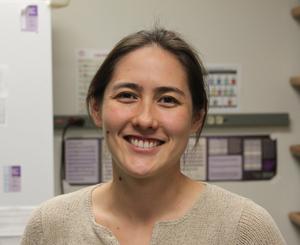ESP Biography
ERIN SCHWARTZ, a little Alaskan in a great big world of science.
|
Major: Biology College/Employer: Stanford University Year of Graduation: N/A |

|
Brief Biographical Sketch:
I am a Stanford postdoc who is passionate about research, education, and promoting the success of future science enthusiasts. Past Classes(Clicking a class title will bring you to the course's section of the corresponding course catalog)L4731: The College Decision in Splash Fall 2015 (Nov. 07 - 08, 2015)
Colleges come in every shape and size imaginable; the ways they are different are as vast as their number. Because of this diversity, it is important to pick an institution that is right for YOU.
In this 2-hour class we will take the first hour to introduce different types of colleges and professional institutions, and then go more in depth into the considerations that people make in deciding where to attend. You will participate in hands-on activities to identify what you personally value in a post-secondary education to help you organize your ideas of what you want in a college. In the second hour I will bring in a panel of students and professionals from different undergraduate institutions to share their thoughts about their college selection.
B4732: DNA Damage and Cancer in Splash Fall 2015 (Nov. 07 - 08, 2015)
Are you curious about the molecular mechanisms of cancer development? If so, then join us for a class on DNA damage and Cancer. In this class we will discuss the intimate link between DNA damage and cancer development. This includes looking at the various sources of DNA damage that you encounter every day, how your body responds to DNA damage in the cell, and what happens in the case of cancer.
B4006: Introduction to DNA structure and function in Splash Fall 2014 (Nov. 08 - 09, 2014)
What is DNA and how is it being used in the cell? In this introductory course we will use lecture and small group exercises to go over the basic concepts of DNA: what is it built from and how it is arguably the most important component of the cell. For more advanced topics relating to DNA, consider enrolling for ‘Dynamic DNA’. There, we will apply the knowledge from this introductory class to explore the environment within the nucleus and the protein machines that control how DNA is packaged and moved.
B4007: Dynamic DNA in Splash Fall 2014 (Nov. 08 - 09, 2014)
Description: Do you think that DNA is just sitting in the nucleus waiting to be used? Think again! DNA is highly dynamic - constantly changing shape and even moving throughout the nucleus. In this class we will explore the amazing world of DNA, and discuss some of the challenges that the cell needs to overcome to package, access, and repair this amazing molecule.
If you unfamiliar with DNA structure and how the cell uses it, please consider taking ‘Introduction to DNA structure and function’ which will provide the background necessary to get the most out of this class. See you there!
W4008: Selecting a college in Splash Fall 2014 (Nov. 08 - 09, 2014)
Hear from a panel of young professionals about their college experiences and how they selected their respective schools. There will be representatives from a diverse collection of colleges and universities, including large public and small private universities.
B3318: When DNA gets damaged in Splash! Fall 2013 (Nov. 02 - 03, 2013)
DNA contains the information for all of the parts of a cell. But what happens when DNA gets damaged?
In this course, we discuss the different ways that cells have adapted to repair and tolerate changes in their DNA. We also discuss how defects in DNA repair pathways can lead to human disease, such as cancer.
W3321: Exploring science in Splash! Fall 2013 (Nov. 02 - 03, 2013)
Are you interested in learning more about science in general? In this class, we will look at some recent research discoveries while exploring several online scientific resources. By the end of the class, you will have increased your exposure to latest developments in science and technology, and have the tools to explore your own interests beyond the classroom.
B2892: Vertebrate Embryology in Splash! Spring 2013 (Apr. 13 - 14, 2013)
Isn’t it amazing that the trillions of cells in your body all descended from a single fertilized egg?! Even more remarkable is that the early embryos of ALL vertebrates (even of people) look essentially identical--a fact that scientists use to explore human development. For example, developmental biologists have utilized chick embryos as a model to study blood vessel development.
Come to this class to learn what developmental biologists are interested in and what they do on a daily basis. We hope you will leave with some experience in chick embryo culture techniques, dissection skills, and vertebrate anatomy. We will also briefly address the ethical use of animal models in basic research that is geared towards advancing human health.
|
|
